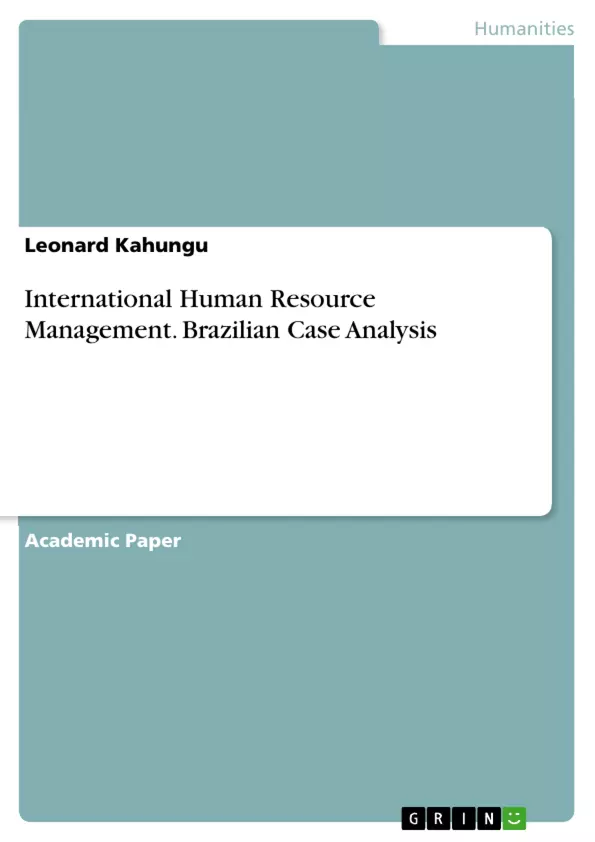Cultural competence is defined as collective and congruent behaviours, policies, and attitudes that allow an agency, system as well as a group of professionals to function effectively in multicultural environments. The concept of cultural competence is increasingly becoming paramount in the contemporary organisational management practices, especially in healthcare settings.
Attaining cultural competence in attempts to enhance the quality of organisational culture, management, internal and external relations requires a critical analysis of socioeconomic and political factors. Therefore, the International Red Cross (IRC) requires to understand the national culture of Brazil and compatible reward systems in the management of human resources. This information is critical in ensuring that the required IRC human resources are managed efficiently for maximum productivity.
Inhaltsverzeichnis (Table of Contents)
- Executive Summary
- Introduction
- PART I
- Brazilian Hofstede Cultural Analysis
- Power Distance Index (PDI)
- Uncertainty Avoidance
- Individualism versus Collectivism
- Masculinity versus Feminine
- Long Term versus Short Term Orientation
- Indulgence versus Restraint
- PART II
- Performance Management Reward System
- PART III
- EPRG Framework
- Recommendations
- General Manager
- Conclusion
- References
Zielsetzung und Themenschwerpunkte (Objectives and Key Themes)
This report aims to analyze the cultural factors in Brazil and develop compatible reward systems for managing a multinational workforce, specifically for the International Red Cross (IRC). The report utilizes the Hofstede Cultural Dimensions model to understand the cultural nuances of the Brazilian workforce, aiming to create an efficient and productive work environment.
- Understanding the influence of Brazilian culture on workforce management
- Analyzing the Hofstede Cultural Dimensions of Brazil
- Developing suitable reward systems aligned with Brazilian cultural values
- Exploring the impact of cultural competence on organizational effectiveness
- Formulating recommendations for managing a multinational workforce in Brazil
Zusammenfassung der Kapitel (Chapter Summaries)
- Executive Summary: This section provides a concise overview of the report's purpose, focusing on the importance of cultural competence in managing a multinational workforce, particularly in the context of the IRC's operations in Brazil.
- Introduction: This chapter introduces the concept of globalization and its impact on workforce diversity, highlighting the need for culturally competent human resource management practices in international organizations.
- PART I: Brazilian Hofstede Cultural Analysis: This section examines the Brazilian culture through the lens of the Hofstede model, analyzing key dimensions such as power distance, uncertainty avoidance, individualism vs. collectivism, masculinity vs. femininity, long-term vs. short-term orientation, and indulgence vs. restraint. The analysis provides insights into the cultural values and norms that shape the Brazilian workforce.
- PART II: Performance Management Reward System: This part of the report focuses on developing a performance management and reward system that aligns with the cultural insights gained from the analysis of the Hofstede dimensions. It explores various reward systems and their effectiveness in motivating and retaining Brazilian employees.
- PART III: EPRG Framework: This section delves into the EPRG framework, a model for understanding the various stages of organizational integration. The analysis examines the application of the EPRG framework to managing a multinational workforce in Brazil.
- Recommendations: This chapter presents specific recommendations for managing a multinational workforce in Brazil, taking into account the cultural nuances identified in the previous chapters. It offers practical strategies for promoting cultural competence and enhancing workforce productivity.
- General Manager: This chapter focuses on the role of the General Manager in driving cultural competence within the organization, providing guidance on effective leadership strategies for managing a diverse workforce in Brazil.
Schlüsselwörter (Keywords)
This report focuses on international human resource management, specifically within the Brazilian context. The key themes include cultural competence, Hofstede Cultural Dimensions, reward systems, multinational workforce, organizational effectiveness, globalization, and the EPRG framework.
Frequently Asked Questions
What are Hofstede's Cultural Dimensions?
It is a framework for cross-cultural communication that measures national cultures based on dimensions like Power Distance, Individualism, and Uncertainty Avoidance.
How does Brazilian culture score on Power Distance?
Brazil typically scores high on the Power Distance Index (PDI), meaning there is a high acceptance of hierarchy and unequal distribution of power within organizations.
Is Brazil an individualistic or collectivistic society?
Brazil is generally considered a collectivistic society, where strong relationships and loyalty to groups (family or work teams) are highly valued.
What reward systems work best for Brazilian employees?
Due to the collectivistic nature, group-based rewards and those that emphasize social recognition or benefits for the family are often very effective.
What is the EPRG Framework in HR management?
The EPRG framework categorizes international management strategies into four types: Ethnocentric, Polycentric, Regiocentric, and Geocentric.
- Quote paper
- Leonard Kahungu (Author), 2018, International Human Resource Management. Brazilian Case Analysis, Munich, GRIN Verlag, https://www.grin.com/document/428629



